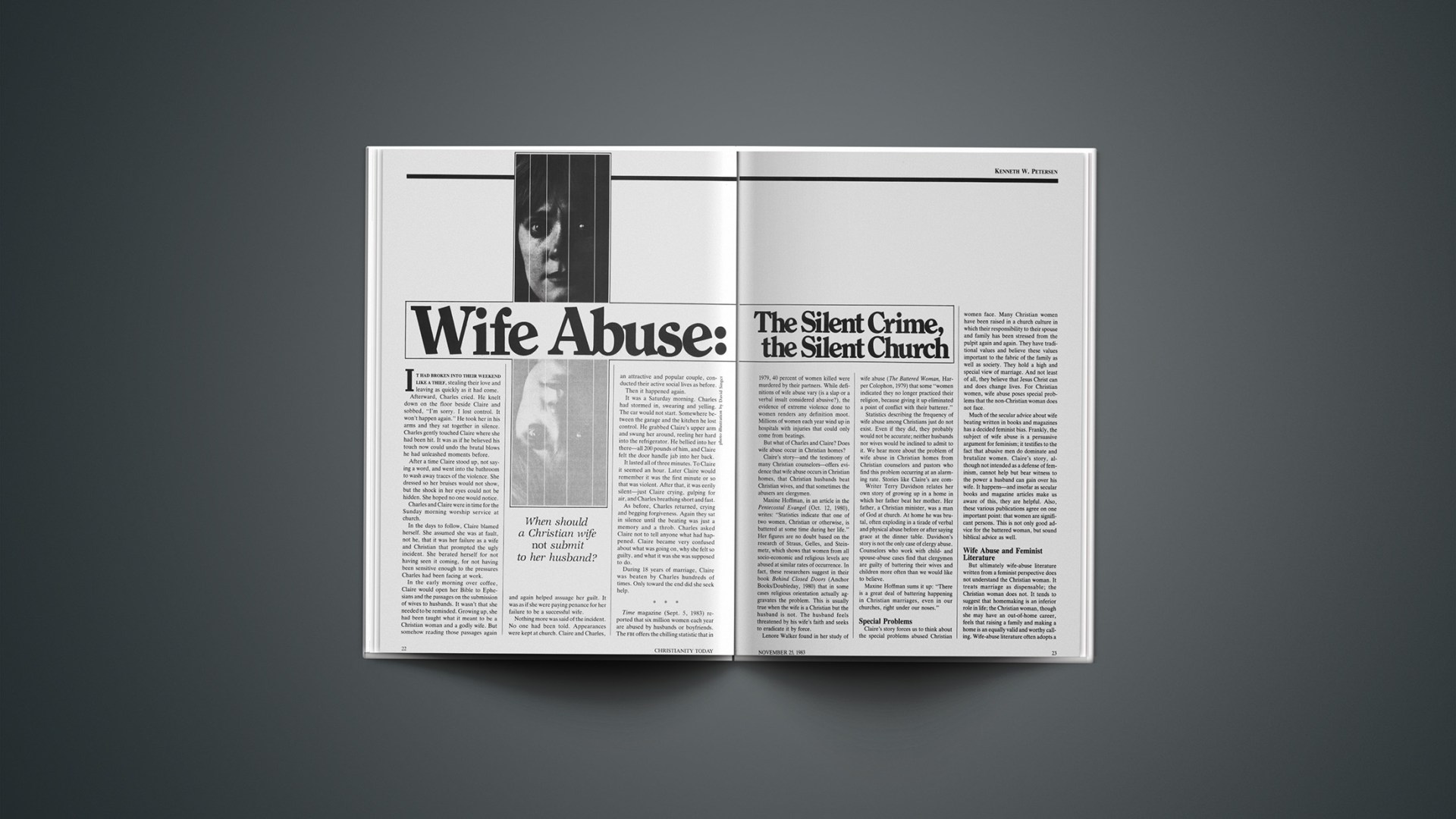It had broken into their weekend like a thief, stealing their love and leaving as quickly as it had come. Afterward, Charles cried. He knelt down on the floor beside Claire and sobbed, “I’m sorry. I lost control. It won’t happen again.” He took her in his arms and they sat together in silence. Charles gently touched Claire where she had been hit. It was as if he believed his touch now could undo the brutal blows he had unleashed moments before.
After a time Claire stood up, not saying a word, and went into the bathroom to wash away traces of the violence. She dressed so her bruises would not show, but the shock in her eyes could not be hidden. She hoped no one would notice.
Charles and Claire were in time for the Sunday morning worship service at church.
In the days to follow, Claire blamed herself. She assumed she was at fault, not he, that it was her failure as a wife and Christian that prompted the ugly incident. She berated herself for not having seen it coming, for not having been sensitive enough to the pressures Charles had been facing at work.
In the early morning over coffee, Claire would open her Bible to Ephesians and the passages on the submission of wives to husbands. It wasn’t that she needed to be reminded. Growing up, she had been taught what it meant to be a Christian woman and a godly wife. But somehow reading those passages again and again helped assuage her guilt. It was as if she were paying penance for her failure to be a successful wife.
Nothing more was said of the incident. No one had been told. Appearances were kept at church. Claire and Charles an attractive and popular couple, conducted their active social lives as before.
Then it happened again.
It was a Saturday morning. Charles had stormed in, swearing and yelling. The car would not start. Somewhere between the garage and the kitchen he lost I control. He grabbed Claire’s upper arm and swung her around, reeling her hard into the refrigerator. He bellied into her H there—all 200 pounds of him, and Claire felt the door handle jab into her back.
It lasted all of three minutes. To Claire it seemed an hour. Later Claire would remember it was the first minute or so that was violent. After that, it was eerily silent—just Claire crying, gulping for air, and Charles breathing short and fast.
As before, Charles returned, crying and begging forgiveness. Again they sat in silence until the beating was just a memory and a throb. Charles asked Claire not to tell anyone what had happened. Claire became very confused about what was going on, why she felt so guilty, and what it was she was supposed to do.
During 18 years of marriage, Claire was beaten by Charles hundreds of times. Only toward the end did she seek help.
Time magazine (Sept. 5, 1983) reported that six million women each year are abused by husbands or boyfriends. The FBI offers the chilling statistic that in 1979, 40 percent of women killed were murdered by their partners. While definitions of wife abuse vary (is a slap or a verbal insult considered abusive?), the evidence of extreme violence done to women renders any definition moot. Millions of women each year wind up in hospitals with injuries that could only come from beatings.
But what of Charles and Claire? Does wife abuse occur in Christian homes?
Claire’s story—and the testimony of many Christian counselors—offers evidence that wife abuse occurs in Christian homes, that Christian husbands beat Christian wives, and that sometimes the abusers are clergymen.
Maxine Hoffman, in an article in the Pentecostal Evangel (Oct. 12, 1980), writes: “Statistics indicate that one of two women, Christian or otherwise, is battered at some time during her life.” Her figures are no doubt based on the research of Straus, Gelles, and Steinmetz, which shows that women from all socio-economic and religious levels are abused at similar rates of occurrence. In fact, these researchers suggest in their book Behind Closed Doors (Anchor Books/Doubleday, 1980) that in some cases religious orientation actually aggravates the problem. This is usually true when the wife is a Christian but the husband is not. The husband feels threatened by his wife’s faith and seeks to eradicate it by force.
Lenore Walker found in her study of wife abuse (The Battered Woman, Harper Colophon, 1979) that some “women indicated they no longer practiced their religion, because giving it up eliminated a point of conflict with their batterer.”
Statistics describing the frequency of wife abuse among Christians just do not exist. Even if they did, they probably would not be accurate; neither husbands nor wives would be inclined to admit to it. We hear more about the problem of wife abuse in Christian homes from Christian counselors and pastors who find this problem occurring at an alarming rate. Stories like Claire’s are com-
Writer Terry Davidson relates her own story of growing up in a home in which her father beat her mother. Her father, a Christian minister, was a man of God at church. At home he was brutal, often exploding in a tirade of verbal and physical abuse before or after saying grace at the dinner table. Davidson’s story is not the only case of clergy abuse. Counselors who work with child- and spouse-abuse cases find that clergymen are guilty of battering their wives and children more often than we would like to believe.
Maxine Hoffman sums it up: “There is a great deal of battering happening in Christian marriages, even in our churches, right under our noses.”
Special Problems
Claire’s story forces us to think about the special problems abused Christian women face. Many Christian women have been raised in a church culture in which their responsibility to their spouse and family has been stressed from the pulpit again and again. They have traditional values and believe these values important to the fabric of the family as well as society. They hold a high and special view of marriage. And not least of all, they believe that Jesus Christ can and does change lives. For Christian women, wife abuse poses special problems that the non-Christian woman does not face.
Much of the secular advice about wife beating written in books and magazines has a decided feminist bias. Frankly, the subject of wife abuse is a persuasive argument for feminism; it testifies to the fact that abusive men do dominate and brutalize women. Claire’s story, although not intended as a defense of feminism, cannot help but bear witness to the power a husband can gain over his wife. It happens—and insofar as secular books and magazine articles make us aware of this, they are helpful. Also, these various publications agree on one important point: that women are significant persons. This is not only good advice for the battered woman, but sound biblical advice as well.
Wife Abuse And Feminist Literature
But ultimately wife-abuse literature written from a feminist perspective does not understand the Christian woman. It treats marriage as dispensable; the Christian woman does not. It tends to suggest that homemaking is an inferior role in life; the Christian woman, though she may have an out-of-home career, feels that raising a family and making a home is an equally valid and worthy calling. Wife-abuse literature often adopts a cynical, negative attitude toward Christianity, seeing it as the historical cause for the oppression of women. The Christian woman understands that throughout history this has sometimes been true, but that it is not in keeping with the teaching and example of Jesus Christ.
So the Christian woman may not find in the available published material on domestic violence any sympathy for her spiritual beliefs, and her special needs may not be adequately addressed.
The Problem Of Submission
The central dilemma for Christian women caught in marital abuse is how to fulfill the biblical teaching on submission. (This is a good example of how secular advice to the battered woman so often fails. Most of the books on wife beating treat submission briefly and condescendingly; they do not understand that submission is an important part of the way millions of women think about their families and homes.)
Of course, submission is a controversial subject in the Christian community. One look inside a Christian bookstore at all the books on marriage and submission testifies to how this debate rages. Not only has submission been argued pro and con, but endless varieties of submission teaching have been proposed. The argument has become sophisticated and complex.
Unfortunately, this complexity is not recognized by many Christians, and some churches emphasize submission to the extreme, proposing absurd hypothetical situations. At least one pastor has preached from the pulpit that if a husband asks his wife to submit to an act of prostitution, she should do so.
These teachings confuse even more the already distraught Christian woman suffering from abuse. Many who are abused acquiesce to these extreme views, even when their lives are in danger.
A rigid perspective on the subject of submission also contributes to a psycho-social syndrome called “learned helplessness” in which a battered woman accepts the violence done to her as part of the course of her life, believes she has no options available, and falls into a numb passiveness. Most battered women experience learned helplessness to a degree; it explains in part why so many abused women stay with their husbands for so long. It seems to be a major problem among Christian women.
What is lacking, of course, is a balance of teaching in our churches: We need to hear not only what the Bible says about submission, but also what the Bible says about the sanctity of life. We need to read not only Paul’s injuctions concerning the role of women in the church, but also Christ’s compassionate and radical treatment of women during his earthly ministry.
You Can Help A Battered Wife
Many people—pastors and professional counselors included—don’t know what to say to the battered woman. Some are insensitive; some male counselors or pastors who do not really recognize the extent and seriousness of the problem tend to treat the abused woman lightly or chauvinistically. But most of the time good counseling is hindered simply by the shock of learning that good friends are involved, that a marriage perceived as strong and successful may in fact be deeply troubled.
All abuse situations are different; consequently it is up to the counselor to discern individual, special needs. Here are some general suggestions culled from those who have counseled abused women.
1. Believe that she has been abused. Probably what the battered woman needs more than anything is someone to believe in her. The worst thing a counselor can do is to suggest that the woman in some way “asked for” the abuse or to imply that the abuse is her fault. She already is carrying around a hefty load of guilt, and she doesn’t need that kind of counsel.
2. Pray with her. Besides the fact that prayer is efficacious—it works!—there is a psychological value. Often a woman has already been praying—for a change in her husband, for help, for deliverance—but has not felt she has received a response to her prayer. Praying with someone else, knowing that another soul is going before God along with her, gives her renewed hope and faith.
3. Determine the frequency and severtiy of the abuse. Quite frankly, the abuse of women takes many forms, from verbal abuse to violent threats on a woman’s life. If a woman is in a life-threatening situation, she needs to be protected—and advised to leave the home.
4. Emphasize the woman’s responsibility to take action. What the counselor is combating is “learned helplessness,” the syndrome in which the abused woman finds herself that makes her feel there is nothing she can do to help herself.
It is at this point that it becomes important for the counselor to point out the woman’s options. (The abused woman needs to be reminded that there are choices available to her.) She may leave the home, she may go into counseling regularly, she may try to get her husband to join her in family therapy or marital counseling, or she may start by informing some select friends and relatives about what is going on.
5. Encourage her to see a doctor if the abuse has been physical. Many abusers have a method in their madness: they manage to strike a woman in areas where bruises and cuts won’t be noticed. Furthermore, some injuries may be internal, and might not show up anyway. A doctor needs to be consulted.
6. Remind the woman that God loves her and doesn’t want her to suffer abuse. Again, “learned helplessness” leads the abused woman to accept her situation easily, to reason that somehow this is what she deserves. Any such thinking should be addressed as nonsense. God does not want a Christian woman to suffer abuse, and he does not want women to put up with it.
7. Help her find a support community. Direct other friends, church members, relatives toward the woman who is hurting. Perhaps the abused woman has come to you condidentially, in which case you might direct others without specifically explaining the situation. “Mary is hurting; she needs you. Be close to her this week.”
KENNETH W. PETERSEN
One pastor, C. Donald Cole, has sought this very balance. In his Christian Perspectives on the News, a periodic radio newsletter issued from Moody Bible Institute, he writes, “Man’s lordship over women has been exploitive to the point of physical degradation and beyond.” He quotes 1 Peter 3:7, “Husbands … be considerate as you live with your wives.…” Cole concludes his newsletter by saying, “If we participate in the institutionalized abuse of women … how much is our religion worth?”
Christians cannot read the Gospels without sensing the value Jesus attributed to women, women who often found themselves in places of subservience and abuse. Jesus said, “The Spirit of the Lord … has sent me … to set at liberty those who are oppressed” (Luke 4:18). When Jesus spoke to the woman taken in adultery, he said, “Where are those thine accusers? Hath no man condemned thee?… Neither do I condemn thee: go, and sin no more” (John 8:10–11, KJV).
“In the life of Jesus of Nazareth, the character of God is revealed as one who sides with the oppressed, those unfairly treated in society, and whose judgment is on those who oppress, who misuse others for their own selfish ends,” Susan Thistlewaite writes in Christianity and Crisis (Nov. 16, 1981).
This is what abused Christian women desperately need to hear. Otherwise their religion and their church become more a prison than a refuge.
The Teaching On Divorce
A report in the St. Paul Dispatch by staff writer Wayne Christensen concerned one wife who had been battered by her husband for many years. She was a Christian and held strong convictions concerning the sanctity of marriage. But she could take just so much physical abuse. She went to her pastor for help. She said she did not believe in divorce, but that her life was in danger. She wanted to move out.
“But the minister didn’t understand that. He told her she married for better or for worse, that she should go home and pray and work it out, that she shouldn’t upset her husband, … that to have him arrested or kicked out of the house was morally wrong, … that the sanctity of the home is based in accepted religious values, that even if he’s kicking her in her pregnant abdomen her marriage is ‘a holy state of matrimony’ and she should endure her suffering and hold the family together.”
Many Christians believe, as did this minister and abused wife, that divorce is unacceptable for Christians. The biblical teaching about divorce is specific and authoritative, coming as it does straight from the lips of Christ. As happened in this case, some abused Christians who feel strongly about the divorce teaching may discourage themselves or be discouraged by well-meaning friends and professionals from leaving their husbands, getting out of the home, and seeking shelter.
Divorce is a significant doctrinal question, one in which there seems to be less variance than in the matter of submission. Certainly, Christians’ liberalized attitudes toward divorce are to be lamented. “Easy” divorce in Christian circles has yielded tragic results.
But there is something disturbing about the Christian pastor or counselor who, confronted by a woman who has been violently battered, immediately starts flipping the pages of Scripture, quoting the biblical texts on the subject of marriage and divorce. After all, do we really need chapter and verse to recognize the wrong, the horrendous evil, done to the woman? Or maybe a better question is, Haven’t the teachings of Scripture concerning God’s love, the sanctity of life, and the responsibilities of husbands to wives gotten past our heads and into our hearts?
The divorce teaching in regard to the issue of wife abuse is not really the point, yet it is often made to be. There are many options short of divorce open to the woman suffering from abuse. Leaving the home, protecting oneself, leads as often to real treatment of the problem—the psyche of the abuser—as it leads to separation or divorce.
The Salvation Syndrome
This may best be illustrated by Claire’s own story. As a teen-age girl she felt sorry for Charles. She felt she could help him find himself. She was a Christian; he was not. Chaire felt that with time and understanding Charles might come to Christ. She married him.
She was abused three times within the first two weeks of marriage.
Yet Claire stayed with Charles, hoping that he would come around, that maybe through her help he would trade in his nominal Christianity for the real thing.
That is the “salvation syndrome.” Many Christian wives possess this same spiritual sense of responsibility for their non-Christian husbands. A Christian woman may see herself as her non-Christian husband’s rescuer, enabler, perfecter, and ultimately even his savior. This last role—savior—may be the one the abused Christian woman emphasizes: she may feel, mistakenly, that if he becomes a Christian the abuse will stop and the problem will be solved.
One woman (call her Janet) was married to an abusive man for seven years. Finally, she could not take it any more. She divorced him. Within a year Janet found Christ, and her life was transformed. She wanted so much for her ex-husband to discover the new life she had discovered. They remarried. The abuse started again.
Constance Doran, director of Fuller Theological Seminary’s Domestic Violence Program, calls this the “rescuer syndrome.” She says that many women have “rescuer syndrome.” She says that many women have “rescuer fantasies,” in which they perceive themselves not as being helpless or masochistic, but morally strong, able to withstand their husbands’ violence. While the maternal instinct contributes to this, the church often reinforces it.
Lenore Walker says that women told her how their “religious advisers suggested they pray for guidance, become better women, and go home and help their husbands ‘become more spiritual and find the Lord.’ ”
Constance Duran is quoted in Family Life Today (December 1982), “[Abused women] feel that if they just hang in there long enough and turn the other cheek one more time, then he will change. And women are particularly encouraged to do this in the Christian community.”
Unfortunately, the abuser usually does not change without counseling. In fact, the wife’s “saintliness” can provoke the husband even more. An abused woman who feels she can be her husband’s rescuer and savior is not facing reality; she does not understand the antagonistic relationship she is in. The salvation syndrome is dangerous: it may be interpreted by the abuser as a threat and lead to further violence. As Lenore Walker points out, while the wife is waiting for her husband to find the Lord she may be beaten severely. But probably the biggest problem with this syndrome is that it presumes to do the work of God. In seeing herself as rescuer or savior, the woman may forget God’s omnipotence and infinite ability to change people and circumstances—with or without her help. If God can use other persons, the abused wife does not have to keep enduring beatings. In fact, it may be precisely her decision to leave her husband that God uses to move him toward healing, change, and ultimately salvation.
Sexism In The Christian Culture
What is hard to ignore in all this is that the abuse of Christian women is exacerbated by the attitudes of the culture toward women. Christian women are being oppressed partly because the evangelical culture is sexist. For all their talk about “mutual submission” or “equality in submission,” some evangelical Christians practice something quite different.
This is seen partly in the approach of some pastors to the problem. When Claire went to her minister (finally, after 18 years of abuse at the hands of Charles), the first thing he asked her was, “What did you do wrong?” Assuming it was her fault, the pastor sided with Charles, treated Claire like a child, and counseled her to go home to “work it out.”
Lucille Travis (Eternity, Nov. 1981) writes of one pastor “contacted by the husband of a woman from his church who had been at a [wife abuse] shelter for a couple of hours, called her and threatened excommunication if she were not at home by eight the next morning.”
Many pastors simply do not know how to deal with the problem of wife abuse and consequently handle these situations badly, or try to avoid them. But these claims of ignorance do not fully explain the patronizing tones, the sexist smirks, or the condescension by which abused Christian women (and often those not abused) are treated.
This sexism comprises more than just the attitudes of a few pastors or church leaders. It interlaces the entire culture, is part of our history, and is intrinsic to many of our doctrinal positions. R. Emerson Dobash and Russell Dobash suggest in Violence Against Wives (Free Press, 1979) that “the seeds of wife beating lie in the subordination of females and in their subjection to male authority and control.”
The evangelical church may then, by means of its treatment of and attitude toward women, contribute to the climate in which domestic violence is tolerated or even allowed to flourish. Susan Thistlewaite offers a hint of what needs to happen: “If the problem is cultural and partly religious, part of the churches’ task is to examine their own contribution to it.…”
What The Church Should Do
Terry Davidson (Conjugal Crime, Hawthorn, 1978) suggests that it is important that pastors speak out from the pulpit against wife abuse and domestic violence. Churches could consider the needs of abused women a kind of mission field, allotting part of their missionary budgets to the establishing of abuse shelters and homes. A creative approach for churches to pursue is the concept of “shepherding homes,” temporary sanctuary set up in a Christian family’s home to provide shelter for abused women.
But perhaps the most helpful thing a church can do is the simplest: offer its love to those who are hurting.
There are stories of churches’ positive action toward the abused women in their midst. One concerns a woman named Karen.
Although she was a Sunday school teacher, Karen felt aloof and distant from other church members. She felt incapable of telling anyone that her husband was abusing her. But one night her husband brutally attacked her. Karen sang in church the next day in spite of the pain. It was a classic communications gap: Karen could not tell about the abuse, and the congregation was not warm enough or close enough to her to suspect anything was wrong. “I desperately needed people to figure out why I was hurting,” Karen said later. “To me, the [reason] why abused women go on and on covering up is because no one is taking the time to get to know them.”
Later Karen’s husband left her and she needed her church’s support more than ever. She got it. Soon Karen was able to tell close friends what had happened. They responded beautifully, helping her, caring for her, and leading her through the process of healing.
It is difficult to do: church members may be reluctant to get involved in a marital problem—rightly so, for indiscreet “meddling” can be more a problem than a solution. Still, Christians should not be scared away from fulfilling their responsibility. The Living Bible says that we in the church “have been given freedom … to love and serve each other” (Gal. 5:13). And Christ’s statement in Matthew 25:45—“When you refused to help the least of these my brothers, you were refusing help to me”—hauntingly presents the church’s duty to care for those in need.
Perhaps to ameliorate a condition it has in part helped to create, perhaps to fulfill its biblical responsibility—whatever the reason—the Christian church has a responsibility. It needs to take seriously the problem of wife abuse, to seek its prevention, remedy, and healing, and to extend its arms to those abused women in its pews.










